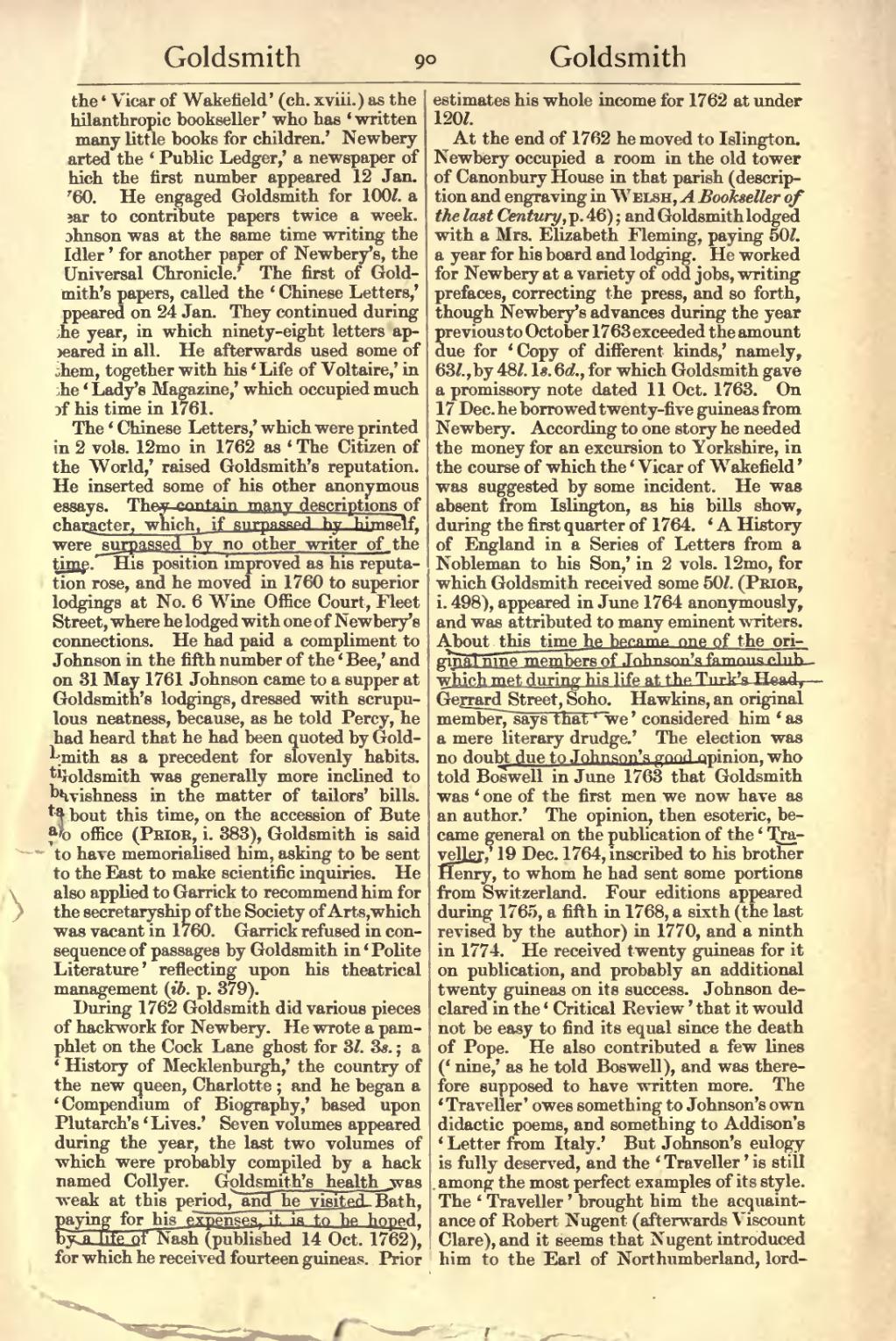in the ‘Vicar of Wakefield’ (ch. xviii.) as the ‘philanthropic bookseller’ who has ‘written so many little books for children.’ Newbery started the ‘Public Ledger,’ a newspaper of which the first number appeared 12 Jan. 1760. He engaged Goldsmith for 100l. a year to contribute papers twice a week. Johnson was at the same time writing the ‘Idler’ for another paper of Newbery's, the ‘Universal Chronicle.’ The first of Goldsmith's papers, called the ‘Chinese Letters,’ appeared on 24 Jan. They continued during the year, in which ninety-eight letters appeared in all. He afterwards used some of them, together with his ‘Life of Voltaire,’ in the ‘Lady's Magazine,’ which occupied much of his time in 1761.
The ‘Chinese Letters,’ which were printed in 2 vols. 12mo in 1762 as ‘The Citizen of the World,’ raised Goldsmith's reputation. He inserted some of his other anonymous essays. They contain many descriptions of character, which, if surpassed by himself, were surpassed by no other writer of the time. His position improved as his reputation rose, and he moved in 1760 to superior lodgings at No. 6 Wine Office Court, Fleet Street, where he lodged with one of Newbery's connections. He had paid a compliment to Johnson in the fifth number of the ‘Bee,’ and on 31 May 1761 Johnson came to a supper at Goldsmith's lodgings, dressed with scrupulous neatness, because, as he told Percy, he had heard that he had been quoted by Goldsmith as a precedent for slovenly habits. Goldsmith was generally more inclined to lavishness in the matter of tailors' bills. About this time, on the accession of Bute to office (Prior, i. 383), Goldsmith is said to have memorialised him, asking to be sent to the East to make scientific inquiries. He also applied to Garrick to recommend him for the secretaryship of the Society of Arts, which was vacant in 1760. Garrick refused in consequence of passages by Goldsmith in ‘Polite Literature’ reflecting upon his theatrical management (ib. p. 379).
During 1762 Goldsmith did various pieces of hackwork for Newbery. He wrote a pamphlet on the Cock Lane ghost for 3l. 3s.; a ‘History of Mecklenburgh,’ the country of the new queen, Charlotte; and he began a ‘Compendium of Biography,’ based upon Plutarch's ‘Lives.’ Seven volumes appeared during the year, the last two volumes of which were probably compiled by a hack named Collyer. Goldsmith's health was weak at this period, and he visited Bath, paying for his expenses, it is to be hoped, by a life of Nash (published 14 Oct. 1762), for which he received fourteen guineas. Prior estimates his whole income for 1762 at under 120l.
At the end of 1762 he moved to Islington. Newbery occupied a room in the old tower of Canonbury House in that parish (description and engraving in Welsh, A Bookseller of the last Century, p. 46); and Goldsmith lodged with a Mrs. Elizabeth Fleming, paying 50l. a year for his board and lodging. He worked for Newbery at a variety of odd jobs, writing prefaces, correcting the press, and so forth, though Newbery's advances during the year previous to October 1763 exceeded the amount due for ‘Copy of different kinds,’ namely, 63l., by 48l. 1s. 6d., for which Goldsmith gave a promissory note dated 11 Oct. 1763. On 17 Dec. he borrowed twenty-five guineas from Newbery. According to one story he needed the money for an excursion to Yorkshire, in the course of which the ‘Vicar of Wakefield’ was suggested by some incident. He was absent from Islington, as his bills show, during the first quarter of 1764. ‘A History of England in a Series of Letters from a Nobleman to his Son,’ in 2 vols. 12mo, for which Goldsmith received some 50l. (Prior, i. 498), appeared in June 1764 anonymously, and was attributed to many eminent writers. About this time he became one of the original nine members of Johnson's famous club which met during his life at the Turk's Head, Gerrard Street, Soho. Hawkins, an original member, says that ‘we’ considered him ‘as a mere literary drudge.’ The election was no doubt due to Johnson's good opinion, who told Boswell in June 1763 that Goldsmith was ‘one of the first men we now have as an author.’ The opinion, then esoteric, became general on the publication of the ‘Traveller,’ 19 Dec. 1764, inscribed to his brother Henry, to whom he had sent some portions from Switzerland. Four editions appeared during 1765, a fifth in 1768, a sixth (the last revised by the author) in 1770, and a ninth in 1774. He received twenty guineas for it on publication, and probably an additional twenty guineas on its success. Johnson declared in the ‘Critical Review’ that it would not be easy to find its equal since the death of Pope. He also contributed a few lines (‘nine,’ as he told Boswell), and was therefore supposed to have written more. The ‘Traveller’ owes something to Johnson's own didactic poems, and something to Addison's ‘Letter from Italy.’ But Johnson's eulogy is fully deserved, and the ‘Traveller’ is still among the most perfect examples of its style. The ‘Traveller’ brought him the acquaintance of Robert Nugent (afterwards Viscount Clare), and it seems that Nugent introduced him to the Earl of Northumberland, lord-
